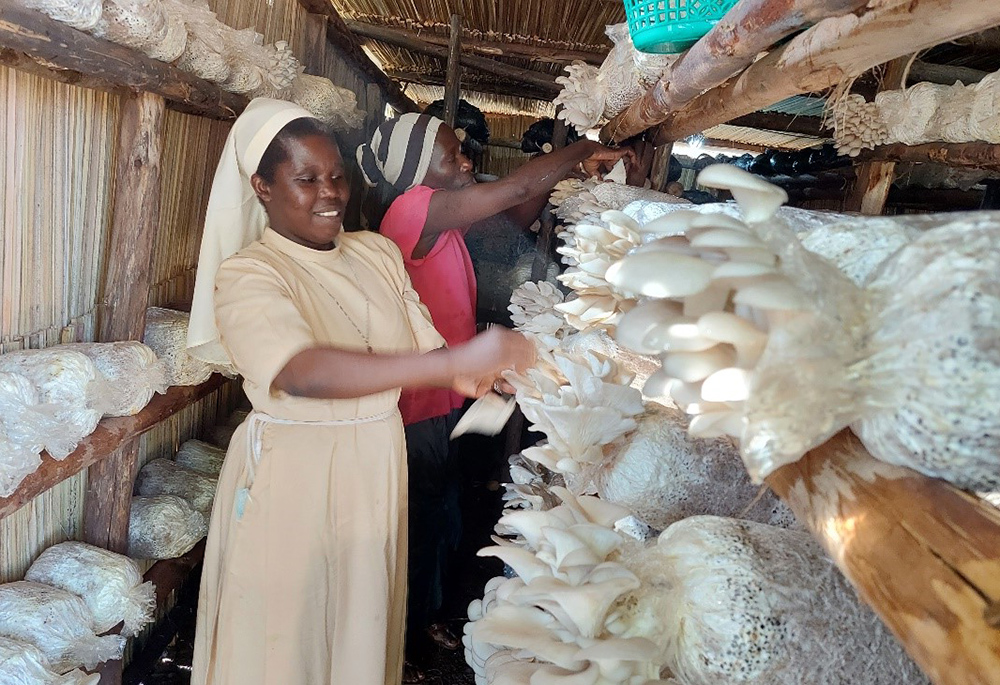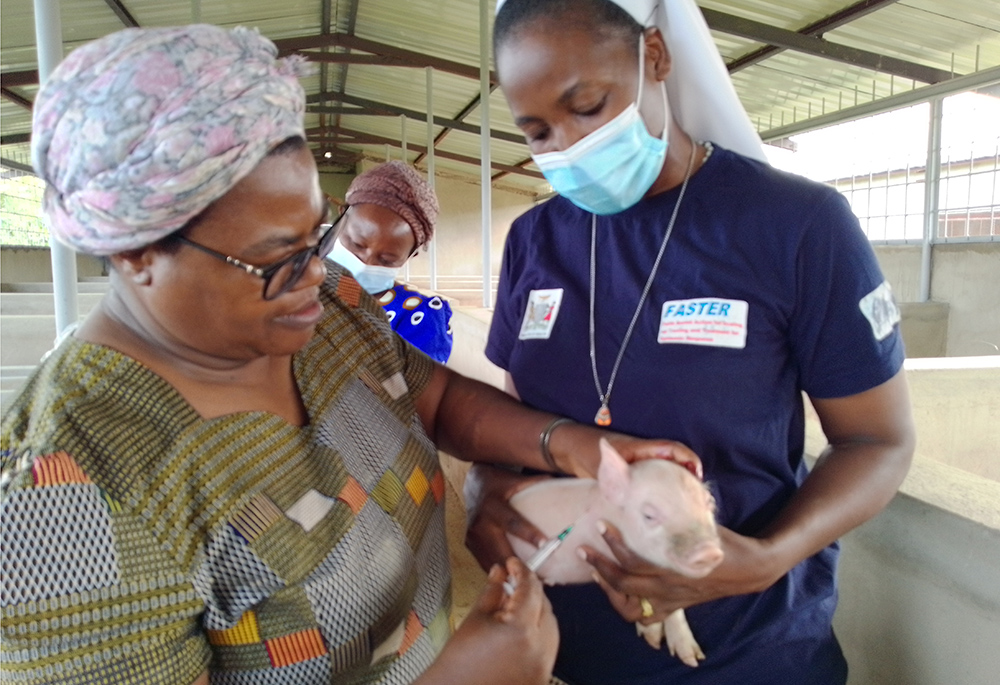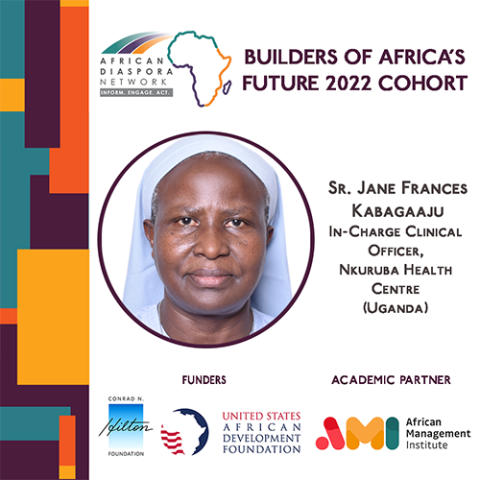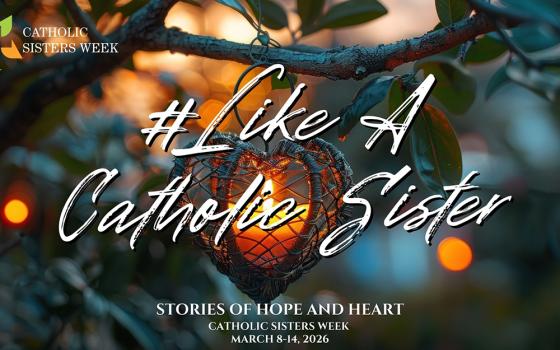
Sr. Rose Thumitho and women harvest mushrooms in Uganda. Sisters and community members diversified into growing mushrooms and other products after COVID-19 adversely impacted markets for chickens. Thumitho completed social entrepreneurship and business training through the Sisters Blended Value Project and the African Diaspora Network. She has worked to convey those skills to others in the community to boost their agricultural enterprises. (Courtesy of Sr. Rose Thumitho)
Helping congregations to be more self-sustainable is a key part of the strategy of the Conrad N. Hilton Foundation's Catholic Sisters Initiative. Enabling sisters to participate in training for entrepreneurship, business and management skills benefits the congregations, their ministries and the people they serve, said Sr. Jane Wakahiu, head of the Catholic Sisters Initiative and a member of the Little Sisters of St. Francis, Kenya.
"Recognizing the decline in charitable giving and utilizing various business practices that ensure these ministries' financial health and continuity is critical,” she said in an email. "The Hilton Foundation's Catholic Sisters Initiative is purposefully supporting sisters to acquire business skills, and become more aware and understand strategies to transform and operate their ministries and do enterprises such as agriculture, healthcare, and education services — without relying heavily on charitable funding." (The foundation is also the major funder of Global Sisters Report.)
There are opportunities, she added, in which "some of the ministries can be transformed to social enterprises so they can be self-sustaining to continue supporting the poor but also generate resources to care for the needs of the sisters so they can continue serving."
Two programs have been instrumental in helping to achieve this strategy. The Sisters Blended Value Project, initially begun under the Miller Center for Social Entrepreneurship at Santa Clara University and now administered through Strathmore University Business School in Nairobi, has trained 334 sisters so far.
Another organization, the African Diaspora Network, or ADN, initiated a program for Catholic sisters in 2021 called "Start Your Social Enterprise" with support from the Hilton Foundation. The training allowed 10 Catholic sisters to participate, with another program for another 10 sisters planned for 2023.
Graduates could then apply to the "Builders of Africa's Future" program run by ADN, offering additional training through the African Management Institute, plus mentorship, networking and opportunities to pitch potential donors and investors.

Sr. Christabel Juunza Mwangani, right, a Religious Sister of the Holy Spirit, based in the Diocese of Monze, in Zambia, tends to a pig with superior general Sr. Rosalia Sakayombo, left. Mwangani was one of three Catholic sisters recognized with a Builders of Africa's Future award in 2022. (Courtesy of Christabel Juunza Mwangani)
Three Catholic sisters were among 11 entrepreneurs recognized with as Builders of Africa's Future in 2022, enabling them to receive the additional training and pitching opportunities. Each 2022 awardee presented their programs and received a $25,000 grant from the U.S. African Development Foundation.
The three — Sr. Jane Frances Kabagaaju, a member of the Daughters of St. Therese of the Child Jesus of Uganda; Sr. Christabel Juunza Mwangani, a member of the Religious Sisters of the Holy Spirit; and Sr. Rose Thumitho of Uganda, of the Little Sisters of St. Francis, Kenya — each wrote columns about their experiences, which are collected here as part of this story package. (Sr. Celestina Nwodo, who runs the Notre Dame Girls' Academy in Nigeria, was among those who received the Builders of Africa's Future award in 2021.)
"They are the most innovative, amazing leaders," said Almaz Negash, founder and executive director of the African Diaspora Network, of the sisters. "Their life is committed to doing good — in that sense they are unique — there is no financial benefit for them. From what they learn, they have the tools to continue to serve the community and society."

Banner for the Builders of Africa's Future 2022 cohort featuring Sr. Jane Frances Kabagaaju, one of 11 entrepreneurs recognized (Courtesy of Sr. Jane Frances Kabagaaju/African Diaspora Network)
Negash and Wakahiu met in 2019 at an African Diaspora Network investor symposium and began discussing the possibility of sisters being included in ADN training and consideration in the Builders of Africa's Future program. It made sense to design a preliminary program, with support of the Hilton Foundation to bolster the sisters' business skills to compete for the BAF awards, Negash said, which has more than 100 applicants. "They are in touch with the very poor and they help people regardless of religion. They need support to help the very people we want to be helped."
The partnership with African Diaspora Network is an opportunity to "bridge the gap between women of faith and the development sector," Wakahiu said, as much of the sisters' work is generally not recognized in the development sector. Noting that ADN training and the Builders of Africa's Future program allowed sisters to showcase their "innovative programs in agriculture and health care to tech investors in Silicon Valley," she said. The partnership has demonstrated success by bringing new perspectives to sisters about business, allowing them to engage with investors and attract resources to "scale up their integral human development ministries," Wakahiu added.
Advertisement
For Sr. Eneless Chimbali, the sisters who have participated in the Sisters Blended Value Project and the African Diaspora Network training are early signs of success of a vision that began in 2018. As the then-secretary general of the Association of Consecrated Women in Eastern and Central Africa, or ACWECA, she served on a panel at a Vatican-sponsored conference on impact investment that year. She met representatives of the Miller Center and learned about their training in "social entrepreneurship."
She and other representatives of ACWECA worked with the Miller Center to devise a program specifically for sisters, which became the Sisters Blended Value Project.
One of the initiatives of ACWECA was sustainability as an organization, but to achieve that, Chimbali said, the sisters' congregations had to become more self-sustaining. (She left as secretary general of ACWECA in January 2020.) "Our desire was to have the sisters have resources for themselves, their mission and to make their charism visible," she said. "We don’t want sisters to do business for the sake of doing business but to make money for the sake of their mission. Our main goal is to serve the other person."







